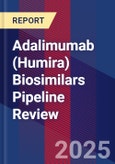This product consists of:
- Competitors described in a tabular format covering drug code/INN, target(s)/MoA, class of compound, territory of main competitor, indication(s) & R&D stage, including published sales data.
- Project History with link to source of information (press release, homepage, abstracts, presentations, annual reports etc).
- One-month online access to the publisher’s database for adalimumab biosimilars (prerequisite: access to internet).
Adalimumab (drug code: LU-200134) was discovered by Knoll Pharmaceuticals, a subsidiary of BASF, using phage display technology from Cambridge Antibody Technology (CAT, acquired by AstraZeneca). In 2001, Abbott acquired Knoll Pharmaceuticals for US$ 6.9 bln, and continued clinical development of adalimumab (drug code: ABT-D2E7) until first approval in 2022 and subsequent approvals in various indications and for different formulations and presentation forms. Since its launch in 2003 for rheumatoid arthritis, Humira annual sales exceeded $1 billion in 2005 for the first time, and exceeded $2 billion in annual sales in 2006. In January 2013, Abbott completed the separation of its research-based pharmaceuticals business, which became AbbVie, a new independent biopharmaceutical company. Humira generated cumulative worldwide (ex Japan) sales for Abbott/AbbVie of more than US$ 213 bln. Eisai holds commercialization rights for Humira in Japan.
Adalimumab is a recombinant human IgG1 monoclonal antibody created using phage display technology resulting in an antibody with human derived heavy and light chain variable regions and human IgG1:k constant regions. Adalimumab is produced by recombinant DNA technology in a mammalian cell (Chinese Hamster Ovary (CHO)) expression system and is purified by a process that includes specific viral inactivation and removal steps. It consists of 1330 amino acids and has a molecular weight of approximately 148 kilodaltons.
In the US, Humira is approved for treatment of
- Moderate to severe rheumatoid arthritis (RA) in adults;
- Moderate to severe polyarticular juvenile idiopathic arthritis (JIA) in children 2 years of age and older;
- Psoriatic arthritis (PsA) in adults;
- Ankylosing spondylitis (AS) in adults;
- Moderate to severe hidradenitis suppurativa (HS) in people 12 years and older;
- Moderate to severe Crohn's disease (CD) in adults and children 6 years of age and older;
- Moderate to severe ulcerative colitis (UC) in adults and children 5 years of age and older;
- Moderate to severe chronic plaque psoriasis (Ps) in adults; and
- Non-infectious intermediate, posterior, and panuveitis in adults and children 2 years of age and older.
Amgen was the first to launch its Humira biosimilar in the US in January 2023, and more entries of Humira biosimilars into the US market are scheduled over the course of 2023, mainly in July.
Biosimilars are follow-on versions of biopharmaceuticals, for which exclusivity has expired. They are approved via stringent regulatory pathways in highly regulated markets (such as EU, US, Japan, Canada, Australia) based on proven similarity of the biosimilar with the originator biopharmaceutical reference product.








